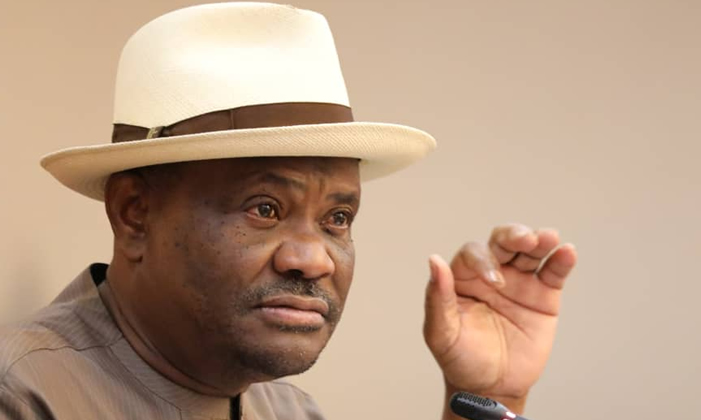Governor of Rivers state, Nyesom Wike has stated that the ongoing legal battle between his state government and the Federal Inland Revenue Service (FIRS) over the collection of value-added tax (VAT) will be a test case to Nigeria’s respect for the rule of law or otherwise.
According to Wike, the state’s decision to seek judicial interpretation on VAT collection was aimed at strengthening rule of law and deepening democracy.
This was stated on Monday by Wike when Ogho Okiti, managing director of BusinessDay newspaper, led a delegation to present a letter of nomination to him as the ‘BusinessDay Most Impactful Governor Award’ at the Government House, Port Harcourt, the state capital.
The FIRS and some state governments are currently embroiled in a legal tussle over VAT collection.
Rivers and Lagos state governments had enacted laws and called for decentralisation of collection, while some states want centralised collection.
But in September, a court of appeal directed the states to maintain status quo pending the determination of an appeal filed by the FIRS.
Rivers State had also asked the supreme court to the supreme court to set aside an order of the court of appeal.
No date has been fixed for the hearing of the case at the apex court.
Speaking on the development, the governor explained that when the legal issue on VAT collection between the Rivers state government and FIRS came up, some people had accused him of trying to divide the country, even when they had not bothered to take a look at the 1999 constitutional provisions regarding the collection of VAT.
“I am happy today that the Attorney General (of the Federation) has gone to the Supreme Court to sue the Rivers State Government over VAT. Now that the Attorney General has gone to court, we are happy,” Wike said.
“But, nobody wants to talk about him dividing the country. It is only when the Rivers State government goes to court that they will say we want to divide the country.
“There is nothing wrong in interpreting the law. The judiciary has been given assignment and they took an oath of office to interpret the law.
“If you don’t go to court, how will we know the position of the law? How will democracy thrive? How will we know that this country respects the rule of law?”
Wike disclosed that Ita Enang, senior special assistant to the president on Niger Delta Affairs, was among those that commended him for approaching the court over the VAT matter.
He recalled that during the just concluded annual conference of the Nigerian Bar Association (NBA), Enang also commended his administration for implementing full autonomy for the state judiciary.
The Rivers state governor said it was baffling that the same presidential aide could turn round to accuse him of treating judges badly in the state.
He warned that the Rivers state government would not succumb to any committee set up by the federal government on the autonomy of state judiciary.
According to him, such a committee is unnecessary since the 1999 Constitution explicitly guarantees the independence of the judiciary.
Wike said that although the federal government tended to profess it supported the autonomy of the judiciary, in reality, it had deliberately stifled that arm of government.
“Fake autonomy which they are brandishing for the judiciary is not true. If the judiciary has autonomy, go and check the status of the federal courts,” Wike added.
“If the judiciary had autonomy, would they have invaded the house of a justice of the supreme court?”
